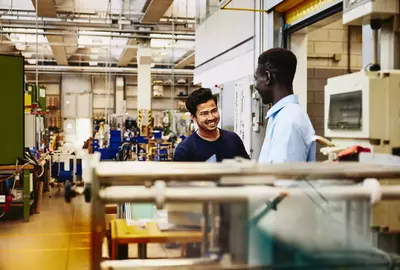The expectations of the job market are shifting. Workers in most sectors are expected to be educated, have computer skills and working knowledge of technology. Fundamental job skills are often taught on the job. Automation has streamlined or eliminated a lot of tasks that once required human intervention. Being educated and having technical skills is no longer the differentiator it once was. As a result, employers are turning to soft skills to evaluate candidates with similar resumes. They’re increasingly seeking human-centric skills that can’t be replicated or replaced by technology as the capabilities of AI continue to grow and encroach on areas that once required human labour.
If you want to future-proof your career, focusing on building your soft skills is a good place to start. Here are some transferrable skills employers will continue to look for as we head deeper into the digital, tech-driven era.
communication
The ability to communicate is vital in any job. Just like most relationships, the employee-employer relationship requires effective communication to operate seamlessly. Both verbal and written communication skills are required to some degree in most jobs. Whether you’re explaining the results of your work to a supervisor, drafting an email to a client, or chatting with a coworker over your morning coffee, communication is a skill we rely on at work every day. And employers know that good communicators make them look good. Strong communication ties in countless other human skills such as empathy, listening, and knowledge of social etiquette. All of these things enhance your ability to be a valued and productive member of your work team and work harmoniously with your leader and coworkers.
collaboration and teamwork
Everyone hated group projects in school because there was always one team member who didn’t pull their weight. If you’re that person in a full-time job, don’t expect your career to last long. Being a valuable contributor and team player is a universal skill that applies to every job. No matter how independent of a worker you are, there’s almost always some part of your job that requires interacting with others. Whether you’re working with colleagues, selling to clients, or handling customers, being able to work well with people is an integral part of being in today’s workforce. Though we use tech as an aid to complete many tasks, it can’t replace a coworker stepping in to help you meet a deadline, or your boss giving you a pep talk before an important presentation. Those are uniquely human skills.
leadership
There are some that say leadership is a skill you’re born with. We disagree. Anyone can learn to be a leader if they want to be – it’s a skill that can be learned and honed. Being a leader doesn’t necessarily mean being charismatic and outspoken. And it definitely doesn’t mean taking control of situations and handing down directives to your reports. Leadership is less about charming employees or issuing commands than it is about having a vision and helping employees find a path to success that works for them and the rest of your team. Those are skills that aren’t going to be obsolete anytime soon. It’s unlikely that machines will have the capacity to be the leaders that employers need. Leaders require emotional intelligence (EQ) and the ability to empathize with their team, something technology remains unable to replicate.
independence
Employers seek out workers they can trust to do their job autonomously without a lot of handholding. Can you pick up new tasks quickly and complete your work without requiring much direction? Are you able to manage your workload and stay motivated without your manager breathing down your neck? Independent workers save their employers a lot of time and energy in just about any role. Low maintenance workers allow managers to spend less time keeping employees productive and more time on other value-added tasks. This is especially true as technology makes it easier for workers to pick up and work from any locale. Employers need workers they can trust to work independently and get things done, whether they’re in the office or working remotely.
critical thinking and problem solving
Machines have come a long way. They’ve outwitted humans when it comes to specialized logic-based tasks. See: AlphaGo, the AI that beat world champions at Go, said to be the most complex strategy game in existence. However, while machine learning has led AI to replicate human intelligence within a certain set of parameters, it’s still no match for the total breadth of human intelligence. Humans are able to achieve an infinite number of goals and objectives in a huge variety of settings and environments. People possess creativity, intuition, ability to think on their feet, and other abilities that factor into their overall ability to approach and solve problems in unique and interesting ways. So while technology may be able to solve very specific, pre-determined problems, humans remain better at big-picture thinking and broad problem solving with unforeseen factors.
common sense
There’s a quote from Voltaire that you might have heard: common sense is not so common. There are a lot of employers out there who would probably agree with this statement unequivocally. What one person deems common sense may not be so obvious to another. Generally, employers look for a level of common sense, general intelligence, or grasp on how things work when making critical hiring decisions. Most employees, no matter their job need to understand basic things to perform at an optimal level and minimize risks to their employer. For example, following critical safety rules would be common sense to most workers. Employers will always need employees who are able to make well-informed, intelligent decisions based on their common sense and intuition.
creativity
Technology is slowly replacing humans in completing tasks that require linear, logical thinking. Machine learning and AI are capable of completing logical tasks on a much more extensive scope than humans; they faster and more accurate. They don’t get tired or bored or make mistakes. However, they’re only able to solve problems or make decisions within parameters chosen by humans. They’re incapable of thinking outside-the-box or coming up with creative solutions to routine problems. Industries that rely on the minds of creatives such as marketing, advertising, writing, and filmmaking are often listed as some of the least likely to be replaced by automation for good reason. While AI may be able to string together a readable sentence through machine learning, it’s incapable of infusing a sense of creativity, humor or uniqueness that make reading it interesting.
Over the years, technology has been creeping into more areas of our work lives. Tasks that used to take humans hours can now be done in a matter of minutes by machines. Many routine, administrative tasks in our workplaces have been taken over by automation. We’re constantly hearing about how automation is killing jobs and replacing human labour. Realistically, there are still many areas where people are absolutely needed. Machines and digital technology may be replacing some basic tasks, but that’s just opening up more room for people-centric skills to take the focus.






